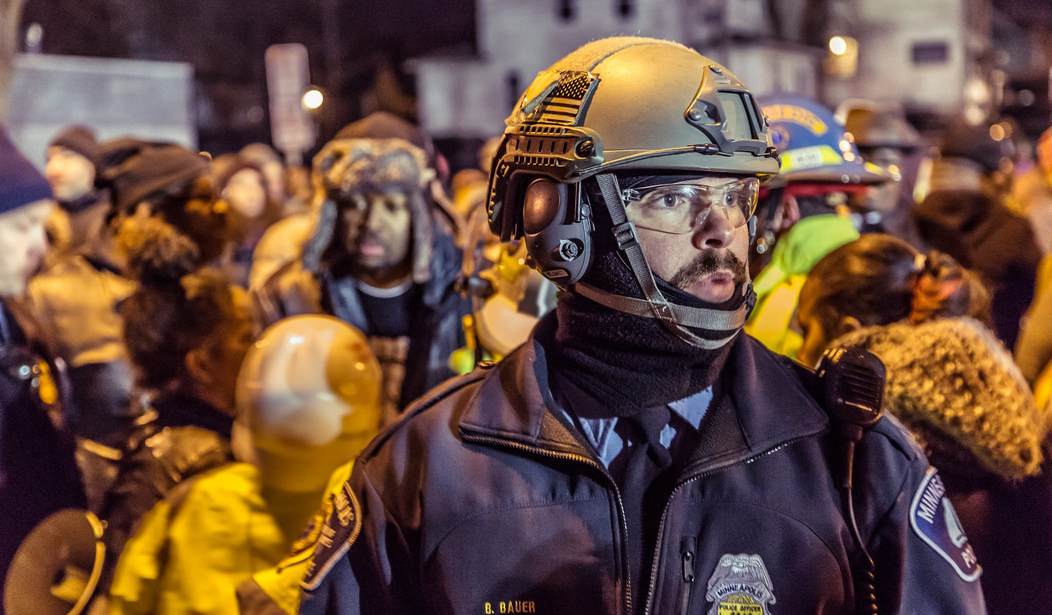The Black Lives Matter movement harbors no shame about breaking the law. In fact, illegality has proven key to their strategy. Days in advance of a planned action, they have announced their intention to trespass on private property or disrupt public infrastructure. They have declared their purpose to “shut down” targeted venues. Consider the audacity of that. They have announced that they are going to violate people’s rights and commit crimes. When law enforcement agencies have responded to restore peace, Black Lives Matter has defied lawful orders, invited arrest, and taken pride in the harm they have inflicted. They brag about having “shut down” businesses, freeways, airports, and other venues, disrupting commerce, impeding travel, and incurring great expense for municipalities.
One Republican legislator in Minnesota has said enough is enough. State Representative Nick Zerwas has authored a bill that would enable government entities to bring civil action against individuals convicted of unlawful assembly. Restitution could be sought to cover law enforcement expenses related to the convict’s disruption.
Critics have condemned the bill as an attack upon free speech. On a local talk radio program, Zerwas was confronted by Minnesota ACLU head Chuck Samuelson. The restitution bill proves unconstitutional, Samuelson said, because it “chills free speech.” But he failed to articulate how.
There is no conceivable way that someone could be sued under the restitution bill for simply saying something. The bill does not address either speech or the content of speech. It addresses conduct, above and beyond speech, which is already prohibited by law. You cannot be convicted of unlawful assembly unless you are physically doing something that violates the rights of others. Unless you trespass where you have no right to be, block freeways and cripple corridors of travel, or unlawfully detain your fellow citizens, then cap it off by refusing lawful orders from the police, the restitution bill could not possibly affect you. It has nothing whatsoever to do with speech.
Some argue that the bill would be selectively utilized to persecute those who oppose the political establishment. But no evidence has surfaced of past wrongful convictions for unlawful assembly. If people could be arrested and convicted for unlawful assembly because of something they said, and not because of something they did, then we would have a much bigger problem on our hands. Such a miscarriage of justice would unquestionably violate the First Amendment and present an attractive case for the ACLU. But they’re not pursuing that case, because no such abuse has occurred.
In truth, as demonstrated by how the radio confrontation continued, Samuelson and folks of similar persuasion oppose any limitation on protest behavior. They want to do whatever they want, whenever they want, however they want, to whomever they want, without legal consequences of any kind, conflating such conduct with protected expression. If it’s for the cause, anything goes. Consider this from Samuelson:
Who decides the size of the [law enforcement] response?… For example, at the Mall of America [the site of an unlawful assembly by Black Lives Matter just before Christmas in 2014], the police response was way, way beyond the amount of the demonstrators. And if that were the case, the bill… that you would present to these individuals would be significantly higher. So the question then is: what’s an appropriate level [of law enforcement response], and who decides that?
How about duly appointed government officials? What’s the alternative? What would Samuelson consider appropriate? One officer to ten protesters? One to a hundred? What standard would Samuelson employ? How are law enforcement agencies supposed to know what resources they’ll need when responding to a mob that is actively breaking the law?
Zerwas addressed the added expense of uncertainty in his reasoning for the restitution bill. Groups who hold lawful demonstrations are frequently required to cover the cost of security, sanitation, and related expenses. Why should agitators organizing unlawful assemblies get off without paying something? Zerwas expounds:
In Minneapolis, St. Paul, and Bloomington, over the last twelve months, we’ve had $2 million in cost to respond to these [unlawful] protests. Now my point is: if those individuals had said, “We want to demonstrate. We’re going to shutdown this road [legally]. We need a permit,” those [law enforcement] costs would have been defrayed. Instead, they do it illegally. They unlawfully assemble. Their intent is to disrupt and shut things down. And that cost is pushed onto homeowners, because local law enforcement agencies are paid for through property taxes that fund cities.
I personally believe, if someone wants to go and stop people from accessing the Minneapolis airport [as Black Lives Matter did just before Christmas in 2015]… or with the intent of shutting down the Mall of America, I don’t believe – personally, fundamentally – that a husband and wife and their two kids should pay for that through their property taxes. I shouldn’t have to pay for you breaking the law.
That proves especially true when those breaking the law do so with the express intent of overwhelming the system. That’s what “shutting down” means, creating an unmanageable disruption that exceeds the capacity of law enforcement. We’re talking about protests thus designed to abuse the taxpayer, along with a list of other victims.
Samuelson tipped his hand when asked whether there is any type of protest which should be illegal. After pausing to consider, he answered, “I don’t think so.” In other words, in his mind, there is no conduct which ought to be prohibited if done in the name of a cause. That’s a ludicrous position, both legally and morally. Nevertheless, it’s the position of the head of the ACLU in Minnesota. It’s the position of Black Lives Matter. And it’s the position of many throughout the culture who romanticize protest to a fault, elevating it above any other consideration, including the rights of others.









Join the conversation as a VIP Member